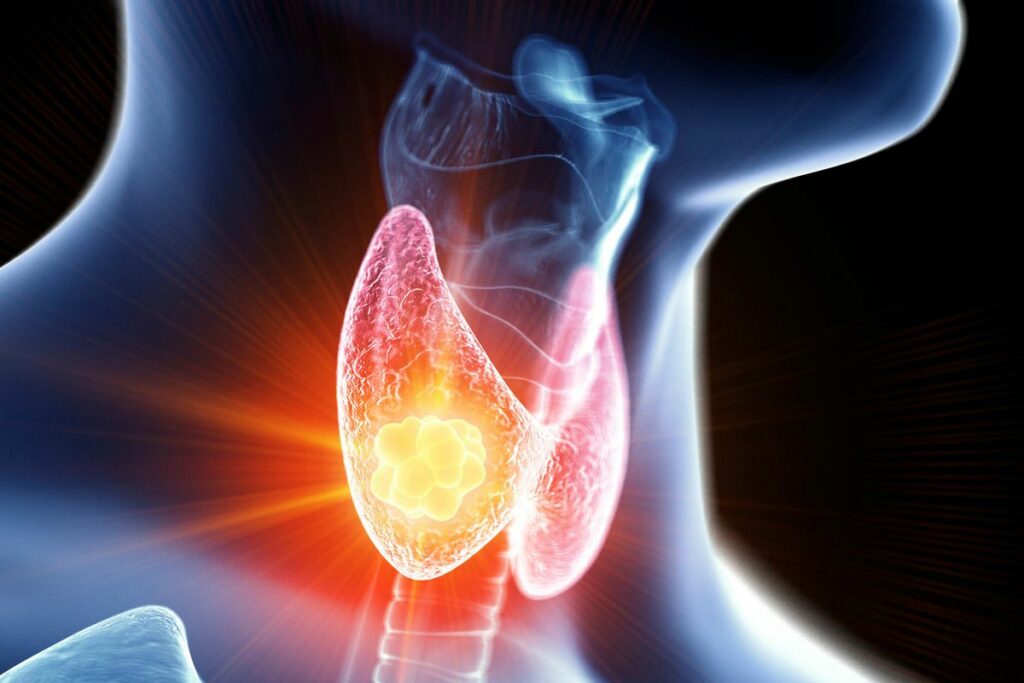Know everything about Goiter form the Best Thyroid Surgeon in India
Introduction:
In our body, organ systems such as immunity, digestive, and endocrine have their respective functions. In them, the endocrine system includes various glands like thyroid, parathyroid, adrenal, etc, which help in regulating body functions. The thyroid gland in the endocrine system is responsible for regulating functions like metabolism, digestive, brain development, fertility, etc. it is located below Adam’s apple and secretes thyroid hormone. Conditions like iron deficiency and grave’s disease can disrupt the thyroid gland function, causing enlargement of the thyroid gland which is called goiter.
Goiter is the most common condition in adults. Particularly women above 40 years or after the end of menopause have more chances of getting goiter. Treatment options depend on the severity and symptoms exhibited. Mild symptoms of goiter can be cured with or without medication, and in rare cases, thyroid hormone treatment may be needed. Consult best Thyroid surgeon in India and get cure for your thyroid.
What are the symptoms and causes of a goiter?
Goiter size varies depending on the severity of the symptoms. The common symptom of goiter is a swollen neck. Other possible symptoms are:
- Hoarse voice
- Dizziness and fatigue
- Difficulty in swallowing
- Difficulty in breathing
- Snoring
- Cough
- Blocked airway
- Hormonal changes
Goiter causes hyperthyroidism (overactive thyroidism) condition, and symptoms include are:
- Sudden weight loss
- Palpitations (fast heartbeat)
- Weakness
- Sleeping problems
- More appetite
- High BP
- Over sweating
- Nervous excitement
- Change in the menstrual cycle
Goiter causes hypothyroidism (underactive thyroidism) condition, and symptoms include are:
- Fatigue
- Constipation problem
- Oversleeping
- Unusual periods (menstruation)
- Sudden weight gain
- Sensitive to cold
- Hair loss
- Being less active
- Absent mind

Causes of goiter:
Many factors cause goiter, but iodine deficiency is the primary cause in the world. Other potential causes are:
Inflammation of the thyroid gland is called thyroiditis. Bacterial or viral infections mostly trigger inflammation, which leads to goiter.
Goiter causes autoimmune disorders like Grave’s and Hashimoto’s diseases. In Grave’s disease, people develop a condition where their immune system attacks the thyroid gland. The swollen thyroid glands produce excess thyroid hormone in the body and cause hyperthyroidism. In Hashimoto’s disease, the pituitary gland produces more TSH, which results in the enlargement of the thyroid gland. The thyroid gland produces less thyroid hormone, and less thyroid hormone production leads to hypothyroidism.
In women, during the pregnancy cycle, their body releases HCG hormone, which induces the thyroid gland to produce excess thyroid hormone. This is the main reason that women are prone to thyroid problems.
Noncancerous, benign, irregular growth of thyroid cells will form as lumps in thyroid gland. The lumps are called nodules, and the number of nodules may vary from patient to patient. Nodules result in enlarged thyroid gland and disrupts hormone production.
Cancer to the thyroid gland will result in enlargement of thyroid gland. The secretion of thyroid hormone is affected due to cancer. Thyroid cancer is rare and proper treatment is needed to cure it.
Tobacco contains thiocyanate, which absorbs iodine present in the body. Less iodine in our body leads to the enlargement of the thyroid gland.
By understanding the various causes of goiter can help in its proper diagnosis and management. If you suspect that you may have a goiter or any thyroid-related issues, it is important to consult your doctor for proper evaluation and treatment.
What are the types of goiters?
Endemic goiter or colloid goiter occurs when there is a shortage of iodine levels in the body. Insufficient iodine will lead to enlargement of the thyroid gland.
Sporadic goiter is also called nontoxic goiter. Enlarged thyroid gland does not produce excess or inadequate thyroid hormone. The cause of sporadic goiter is unknown. In some cases, treatment for bipolar disorders uses lithium drugs, which will result in causing sporadic goiter.
The thyroid gland produces nodules, which produce thyroid hormone in addition to the thyroid gland. Multinodular goiter will result in hyperthyroidism. Proper diagnostic methods like scanning and X-rays identify this condition.
Simple goiter will occur when the thyroid gland is swollen. Insufficient iodine intake will cause simple goiter. This is the most common type of thyroid.
How do doctors diagnose goiter?
Doctors identify goiter by physical examination and run diagnostic tests to confirm the thyroid condition. The most common tests are:
Doctors examine the throat, swelling and signs of nodules on the neck by touching below the jaw and near the vocal cord.
Scanning the neck region(X-ray) is recommended to identify the extent of thyroid enlargement. If the extent of enlargement is more, they recommend MRI or CT scan to measure size and shape.
Required blood tests are conducted to know the hormone, iodine levels and antibodies present in your body.
A small part of the nodule or thyroid gland is dissected to examine the thyroid condition.
Ultrasound test is conducted to view thyroid nodules and goiter in images and videos format.
Treatment options for goiter:
Treatment options for goiter depend on the severity of the goiter and thyroid gland. Conditions like simple goiter and initial stages of goiter are cured with medication. Get appropriate treatment from the best Thyroid surgeon in India.
Medication: Medications include levothyroxine to treat hypothyroidism, corticosteroids for inflammation, and methimazole for hyperthyroidism. Other antihistamines and pain relievers are recommended depending on the severity of the goiter.
Radioactive iodine treatment: Radioactive iodine treatment (RAI) is used to treat overactive thyroid glands or multinodular goiter. Orally RAI is taken to kill excess thyroid cells and bring the thyroid gland to a normal state. Thyroid hormone replacement therapy should be taken throughout your life after RAI.
Surgery: Thyroid surgery is recommended to remove a part or complete thyroid gland. Thyroidectomy removes nodules, cancerous cells and tumors present in the thyroid gland. Medication is required for the rest of your life, depending on the amount of thyroid gland removed. Consult the best Thyroid surgeon in India and get appropriate treatment for goiter
Care after surgery:
- Follow proper medication and diet after goiter surgery, and include enough iodized salt in your diet.
- Take bedrest for 4-5 days and resume your daily activities after consulting with your doctor.
- Go for light exercises or walk for 30-45 minutes daily.
- Consume foods that are rich in iodine, like fish, cheese, strawberries, dairy, and seafood.
- Some problems may persist after surgery. Consult your surgeon and treat it before it becomes worse.
- Do not neglect thyroid hormone treatment after surgery, as it may lead to hypo thyroidectomy or hyper thyroidectomy conditions.
Conclusion
Goiter itself is not a serious condition, but usually, it is a sign of an underlying thyroid disorder. A proper diagnosis and treatment are needed to cure goiter. Consult the best Thyroid surgeon in India and get cure from goiter. By knowing symptoms, causes, and treatment options for goiter, one can take proactive steps to manage their thyroid. It is important to consult with a healthcare professional who provides treatment, guidance and support. There are many treatment options to cure goiter.

Why consult EarSurgeon, Dr. Shree Rao?
Dr. Shree Cuddapah Rao is acclaimed as one of the best Thyroid surgeon in India. With 10+ years of deep domain experience in the field of ENT, she is the director at Dr. Rao’s ENT Super Specialty Hospital. She underwent specialized training in Rhinoplasty / Facial Plastic surgery at Singapore General Hospital, Singapore. She also underwent advanced training in cochlear implant surgery under Padmashri Dr. Milind V Kirtane and had a Fellowship in a cochlear implant. Having performed over 200 successful cochlear implants for patients worldwide, Dr. Shree Cuddapah Rao is also the recipient of several prestigious accolades in the domain of ENT. Dr. Shree Rao is one of the best ent doctor in hyderabad, to book an appointment click here.
Are you looking for
then you have landed at right place!







